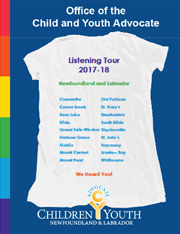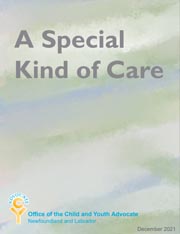 A Special Kind of Care (December 2021)
A Special Kind of Care (December 2021)
This investigation involved a youth with significant disabilities who had been in the care of the Department of Children, Seniors and Social Development for most of her life. Her first out of home placement at two months of age was the first of 11 placements. These placements included a family placement, a long-term foster placement, trial adoptive placements, an emergency placement home, and staffed individualized living arrangements. In one placement, 75 different staff provided care for this youth within a six month period. This investigation identified gaps in residential staff training, lack of residential staff continuity and consistency, poor implementation of resident programs, and deficiencies in collaborating with the various professionals involved in this young person’s care. These issues exist in various residential care settings throughout the province, and are not limited to this young person or the specifics of this investigation.
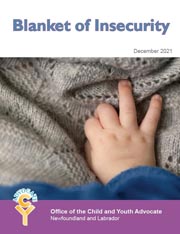 Blanket of Insecurity (December 2021)
Blanket of Insecurity (December 2021)
This Report points to the critical importance of not only timely interventions but also the need for timely decisions in the life of a child. The investigation showed the chaos and instability in a child’s life when there are multiple moves, and multiple caregivers in and out of young lives and revealed the elusive nature of permanence for some children. The Report also showed the essential need for thorough assessments and monitoring to ensure the children are in good hands. It also points out the importance of transferring information and decisions related to a child’s welfare and identifies the significance and consequence when the many professionals who are frequently involved in the lives of these children fail to collaborate.
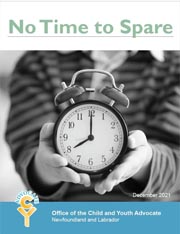 No Time to Spare (December 2021)
No Time to Spare (December 2021)
No Time to Spare is a very clear message about the critical importance of timely interventions in the life of a child. Babies and young children grow and their brains develop at an incredibly fast pace. This is the time and opportunity for them to develop attachments to the adults in their lives. Predictability, responsivity, and constancy are truly important. Secure attachments have a range of positive impacts on the young child, as well as into their future years. The inverse is also true where unstable relationships and lack of attachment have significant negative repercussions on a small child and create further challenges as they grow. The child who was the focus of this report was born into a trauma filled family. However, Child Protection’s response did not provide the positive interventions one should expect and hope.
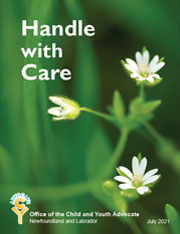 Handle with Care (July 2021)
Handle with Care (July 2021)
This investigation looked at a case involving a seven-year-old child who experienced a mental health or behavioural episode while residing with her mother at a shelter for victims of family violence. Paramedics and uniformed police initially responded. Police then engaged the mobile crisis response team because of its specialized ability to intervene in mental health crises, however the police officers subsequently handcuffed the young child in the absence of the mental health clinician. The Report noted that our communities may have many pressing needs for police enforcement services. However, a misbehaving or mentally unwell young child should not be one of them. The timing of this report presents an opportunity to incorporate the recommendations from this investigation into evolving services and responses so that children in distress receive better responses in the future. There are clear and compelling lessons in this investigation for law enforcement and health care to do better for traumatized children.
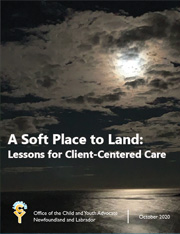 A Soft Place to Land: Lessons for Client-Centered Care (October 2020)
A Soft Place to Land: Lessons for Client-Centered Care (October 2020)
This report looks at the struggles of a young person who died by suicide while residing at a group home, and who had a history of sexual abuse, and a host of complex mental health and addiction issues. Interwoven were issues involving housing, residential services, the criminal justice system, and education services. In some instances, resources and services were clearly unavailable. At other times, significant resources were involved, but were not always appropriately coordinated and integrated. So while many people worked hard for this young person, systemic barriers significantly limited their progress. This report demonstrates that young people do not always fit into neat program criteria or eligibility requirements. Their lives can be chaotic and their life stories can often tell us why. They are frequently rooted in histories of trauma. It is important to meet young people where they are. This report identifies the importance of true client-centered care for young people, and identifies systemic deficiencies.
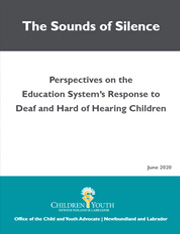 The Sounds of Silence – Perspectives on the Education System’s Response to Deaf and Hard of Hearing Children (June 2020)
The Sounds of Silence – Perspectives on the Education System’s Response to Deaf and Hard of Hearing Children (June 2020)
Children and youth in Newfoundland and Labrador have a right to the best possible education and school experience. There are no exceptions to this right. With this in mind, Newfoundland and Labrador’s Child and Youth Advocate invited young people, their families, professionals, and stakeholders to reach out to discuss their experiences and ideas about education services to deaf and hard of hearing children and youth. This report provides an opportunity to hear and learn directly from those who know this issue well. Most of the responses were critical of the current model of services. This sentiment crossed all groups of participants. However, we also heard some positive stories. These stories offer hope and promise for what the future could hold for deaf and hard of hearing children in the education system.</>
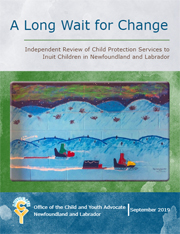 A Long Wait for Change: Independent Review of Child Protection Services to Inuit Children in Newfoundland and Labrador (September 2019)
A Long Wait for Change: Independent Review of Child Protection Services to Inuit Children in Newfoundland and Labrador (September 2019)
- Executive Summary – English | Inuktitut
- Watch Video of the Report Release
The Child and Youth Advocate launched this comprehensive review in April 2018 and released the report in September 2019. This Review examined several program areas where Inuit children receive services from the Department of Children, Seniors and Social Development including protective intervention, in care, foster care, youth services and other alternative placements. The report identifies 33 recommendations resulting from community sessions and other interviews, a review of 213 case files, an analysis of relevant literature on this issue, and from experiences advocating for vulnerable Indigenous children and youth over the years.
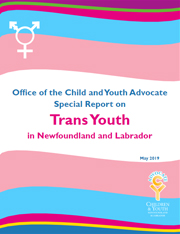 Trans Youth in Newfoundland and Labrador (May 2019)
Trans Youth in Newfoundland and Labrador (May 2019)
This systemic report focuses on the struggles and challenges of many gender diverse youth in Newfoundland and Labrador and presents the stories and experiences shared by young people in focus groups. It builds awareness and amplifies the voices of these youth who have important messages to share about inclusion and discrimination. The Report makes five recommendations and highlights the challenges these youth identified in several key areas, including school, medical, and social support services.
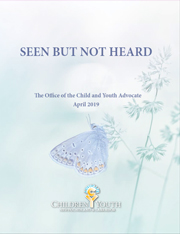 Seen But Not Heard (April 2019)
Seen But Not Heard (April 2019)
This investigation involved children subjected to years of abuse within their family and in a subsequent alternate care arrangement while they were receiving protection services from the Department of Children, Seniors and Social Development. The Report makes six recommendations focusing on several systemic areas for improvement, including early intervention and prevention, mental health responses, services for children in care, as well as permanency planning for children and youth in care.
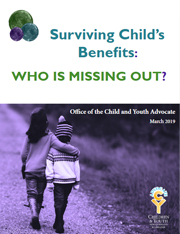 Surviving Child’s Benefits: Who is Missing Out? (March 2019)
Surviving Child’s Benefits: Who is Missing Out? (March 2019)
This report addresses whether all children and youth in Newfoundland and Labrador receive Canada Pension Plan Surviving Child Benefits when their parent dies. This Review concludes that some children of deceased parents in Newfoundland and Labrador do not receive Canada Pension Plan’s Surviving Child’s Benefit. In some cases, these funds are treated as provincial government revenue and never directly reach these children, who are among the most vulnerable. The Advocate recommended government discontinue this practice and set up mechanisms to ensure this benefit is protected for these children and youth.
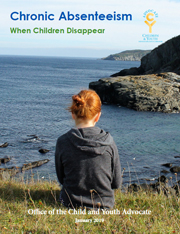 Chronic Absenteeism (January 2019)
Chronic Absenteeism (January 2019)
This report involved a systemic review focused on chronic absenteeism, factors influencing it, impacts on students, and promising strategies to address the problem. This review shows how children who are absent have needs and require responses from many different government services, not just schools. The Advocate made four recommendations to government departments and agencies that have shared responsibility for solutions.
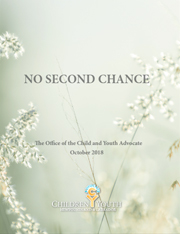 No Second Chance (October 2018)
No Second Chance (October 2018)
This is the story of a young child who endured many tragic events in a short life, and whose involvement with child protection and mental health services did not see the child’s needs met before an untimely and tragic death. The Advocate identified three primary systemic areas for improvement involving monitoring of court ordered conditions, access to mental health services, and the importance of proper risk assessments and child safety plans.
 Making Waves – Ensuring Children Benefit from Child Support Payments (May 2018)
Making Waves – Ensuring Children Benefit from Child Support Payments (May 2018)
This report addressed the government practice of clawing back court-ordered child support payments from Income Support amounts. Income Support covers basic costs of living for the entire family. The Advocate made one recommendation to the Department of Advanced Education, Skills and Labour to eliminate the recovery of child support payments from Income Support Program calculations.
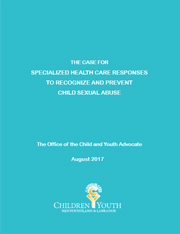 Specialized Health Care Responses (2017)
Specialized Health Care Responses (2017)
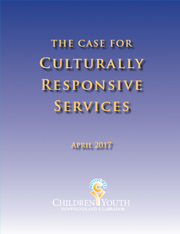 The Case for Culturally Responsive Services (2017)
The Case for Culturally Responsive Services (2017)
A Stolen Life (2016)
A Tragedy Waiting to Happen (2015)
Sixteen (October 2013)
Out of Focus (September 2012)
Turning a Blind Eye (July 2012)
Joey’s Story (August 2011)
An Investigation into Janeway Psychiatry Unit J4D Programs and Services (April 2010)
Lost in Transition: A Review of the Transitioning of Children and Youth In Care (May 2009)
Turner Report (2006):
- Turner Review and Investigation : Volume I
- Turner Review and Investigation : Volume II
- Turner Review and Investigation : Volume III


